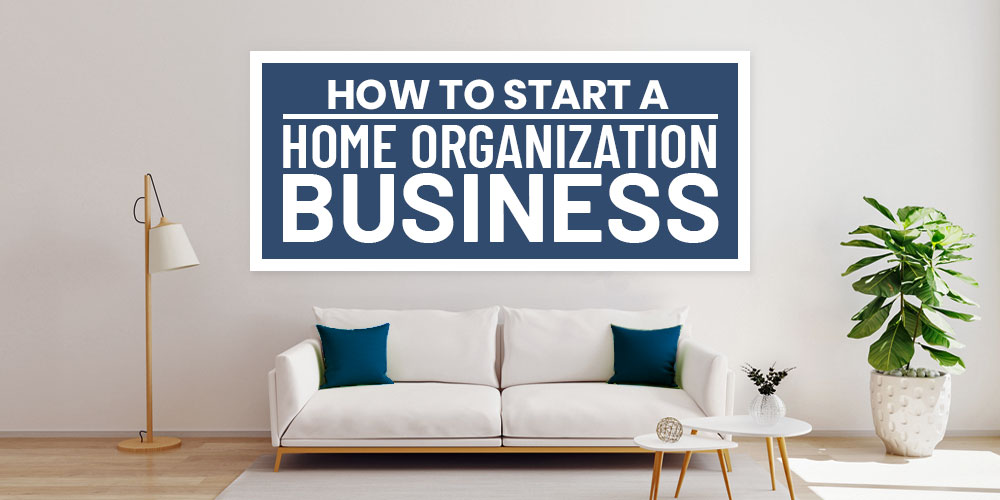
NAVIGATION

Hi, I’m Ryan
As an avid minimalist, I’ve spent a lot of time thinking about the best and most effective way to organize a home. I’ve learned many tricks of the trade over the years when it comes to professional organizing!

Is Starting A Home Organizing Business Right For You?

The idea of starting your own home organization business may feel like a pipe dream, but with a little passion and a lot of planning, you can turn that dream into a reality. When I was beginning my own tiny house business, I was starting something brand new: turning my dream into a business.
You don’t have to be a seasoned entrepreneur to make your dream work. If you have the right tools, the skillset, and the focus to take all the necessary steps, you’ve got this in the bag!
Is There A Good Market For Home Organizing Businesses?
Home organizers are in higher demand than ever before, and for good reason! As people have begun to use their house for more than just day-to-day living, the need for structure and home organization has risen. The increase in minimalist living trends has also encouraged more people to get their homes and lives in better order.
Will A Home Organizing Business Be Successful Where You Live?
If you’re wondering whether or not a home organization business will be successful where you live, your best bet is going to be to research the local home organizing industry. Find out what type of home organization services are needed most in your area, so you can determine whether your niche is a good fit.
 Start by checking Google for the stats that specifically reflect home organizing businesses where you live. Search “home organizing business” with your city or state to investigate the local market. This will help you get a sense of what’s popular in the area you live in, what markets may be flooded, and where there may be opportunities to fill a gap.
Start by checking Google for the stats that specifically reflect home organizing businesses where you live. Search “home organizing business” with your city or state to investigate the local market. This will help you get a sense of what’s popular in the area you live in, what markets may be flooded, and where there may be opportunities to fill a gap.
If you want to go the extra mile, reach out to one of the business owners in your local area to see what advice they have about staking your ground in the city you live in! You’ll find it’s even helpful to talk to friends or acquaintances who are in different industries or lines of work. So long as they’re local business owners, they’ll have some valuable insight for you.
Types Of Home Organizing Businesses

There are a variety of home organization businesses out there, but the type of home organization business that you choose will dictate how you navigate everything in your business plan, from which clients you serve to how you run your organizing sessions.
 Many organization businesses specialize in specific niches. This could look like organizing for specific situations like before or after a move, or organizing a specific space like a closet, a pantry, or a home office.
Many organization businesses specialize in specific niches. This could look like organizing for specific situations like before or after a move, or organizing a specific space like a closet, a pantry, or a home office.
What makes these niche businesses unique is that they specialize in creating organized systems that work with and around the way certain people live their lives or help them through specific experiences or stages of life.
Examples of different organizing businesses and specialties include
- General home organizing
- Household management
- Kitchens
- Move management
- Paper management
- People with disabilities
- Memorabilia and collections
- Seniors
- Space planning and design
- Storage units
- Task and time management
- Konmari
- Adhd
- Children / Students
- Chronic disorganization
- Closets or closet design
- Clutter control
- Digital organizing
- Downsizing
- Eco-organizing
- Estate management
- Feng shui
- Garage, attic, or basement
- Garage or estate sales
- Hoarding behavior
- Home offices
- Home staging
It’s important to choose a niche that personally suits you, so you can really put your heart into your work. Do you love working with seniors to downsize their space, or enjoy creating workable home systems for busy moms? Your organizing business should be a reflection of who you are and what you do best.
Is A Home Organizing Business Profitable?

Whether a client needs help organizing their house, office, or studio, a professional home organizer is always a sensible way to go.
On average, home organizers make between $20K and $80K per year, depending on how full or part time their work is.

12 Steps To Starting A Home Organizing Business

If you’re ready to begin your own home organizing business, you’ll need some tools to help you get started. Quality marketing strategies, an effective business model, and a catchy name are just a few musts to get your own home organization business up and running as soon as possible.
Define What You’re Selling
It’s important that your specific home organization niche is clear both to you and the clients you serve! The first question you need to ask yourself before planning any other aspect of your business is what type of services you plan to provide.
 You don’t have to limit yourself to a single service, but it’s important to make what you’re selling clear early on.
You don’t have to limit yourself to a single service, but it’s important to make what you’re selling clear early on.
When defining your product, be as specific as possible. You want to make your clients aware of the exact skills and services that they’ll be getting when they hire you.
Don’t just list “organizing” or “cleaning.” If you have a specialization like “organizing pantry shelves” or “cleaning before big events,” make sure you list those specifications with clarity on your website.
Determine Your Pricing, Costs, and Profit
After identifying the specific services you want to offer, you’ll need to figure out what to charge your clients, what your supply costs will be, and your estimated profits.
To do this, make a list of each of the individual services you will offer in your business. From there, think through all of the needed supplies to achieve that service, and write down the cost of those needs. This will help you create an accurate estimate of your supply costs.
You should also account for how much time each service will take. After all, time is money! Knowing how much time a particular project or service takes on average will help you to determine what services you can offer within a specific time frame. Which tasks will require just a single day of work, and which projects might take several days or weeks?
Potential Costs For A Home Organizing Business
- Cleaning supplies
- Storage bins, baskets, and other containers
- Label maker and labels
- Gas and transportation
- Computer, supplies, and business equipment
- Office or desk space
- Digital tools (web domain, software, apps, social media)
- Marketing tools (graphic design, business cards, logo)
- Legal services
- Hiring and paying employees

Once you have a general idea of what your supply costs will be, you’ll be able to create a rate that makes sense for you and your business. You might assume that a flat rate is the best way to go, but there are many different ways to charge clients as a home organization business.
Home Organization Business Pricing Guide
| Pricing Option | Average Price |
|---|---|
| Hourly Rate | $50–$75 per hour |
| Fixed Cost | $130–$400 per session |
| Package Prices | • 6 hours of service: $400 • 12 hours of service: $700 • 18 hours of service: $1,000 • 30 hours of service: $1,600 • 60 hours of service: $3,000 |
| Retainer Fees | $40–$60 per hour |
| Cancellation Fees | Additional 5–10% of original fee charged |
| Shopping Fees | Cost of items bought for client, plus $30–$150 per hour |
Package rates can offer better deals for your clients the more often they book you, which can be a smart business strategy. An hourly rate can be financially wiser, as projects that take longer will earn you more money. Using a fixed rate can be easier when it comes to budgeting and keeping track of your finances.
Overall, there isn’t one way to go that’s better than the other. It really just depends on what makes the most sense for you and the way you want to run your business.
Determine Which Tasks You’ll Need To Outsource
It’s unlikely that you will be able to handle every aspect of your business entirely on your own. One of the business strategies I always lean on is hiring others to do the tasks I either don’t have the skills to do or really don’t want to handle alone.
 It may not be in the financial cards for you to hire staff members to fill every position in your business. Instead, think through the skillsets that you naturally bring to the table and commit to handling those on your own.
It may not be in the financial cards for you to hire staff members to fill every position in your business. Instead, think through the skillsets that you naturally bring to the table and commit to handling those on your own.
Then, make a list of the skills you don’t have and the tasks you absolutely do not want to handle, and think through the type of worker you’ll need on your team to fill in these gaps.
Payroll and accounting are some of the most common tasks that small business owners choose to outsource. It also might be a smart idea to hire out for marketing or graphic design so you can focus on what you do best: organizing your clients’ homes.
Validate Your Idea With A Business Model Template
Developing a successful business model is key for any successful business venture. Especially in this kind of business, you want to make sure you have all of your ducks in a row. Being prepared and put together for a client is crucial to establishing a positive relationship, especially in the business of organizing.
Using a pre-established business template is a wise move when starting anything new. It’ll help you keep your ideas in order and figure out the exact plan you should follow to make your business a success.
A Business Template Should Include The Following Items
- Potential or established partnerships
- Activities
- Resources
- Cost structure
- Value propositions
- Revenue streams
- Customer relationships
- Customer segments

Develop A Savvy Business Plan
After filling out your home organization business template and creating a preliminary plan, it’s time to lean into developing your own business plan and identify your goals. The purpose of the business plan is to iron out the concrete details to support the higher brow concepts that you’ve already identified in your business template.v
A Successful Business Plan Should Include The Following Elements
- Business summary
- Company description
- Marketing plan
- Products and services
- Strategy and implementation
- Financial plan and projections
- Policies and procedures


A business plan for a home organizing business will likely look similar to any other business plan, but with the specifics geared toward your niche. Your business plan should help you define the intricate details of your business like how much to charge, how to track your clients, and more.
Come Up With A Name That Sticks
Every business needs a catchy name. Your company name is the first thing potential clients will associate with you and your product. It’s the backbone of your reputation as a company — no pressure!


Think through the message you want to send, the values your business represents, and what makes your company unique. What about your company’s mission, backstory, location, or origin could be turned into a fun, inspiring, memorable business name?


Be sure to look up whether or not your business name has already been taken by checking with the United States Patent and Trademark Office.
Create Your Own Website
Good news: you don’t have to be a tech wizard to create a website. Your website doesn’t have to include all the bells and whistles, it just needs to be effective at communicating what you do and telling customers how to get in touch or schedule a service. You can use a website builder and set yours up in an afternoon.
Consider creating your own domain name to pair with your new site. Websites with URLs like thetinylife.wix.com or thetinylife.wordpress.com look significantly less professional than thetinylife.com, so buying a domain name is money well spent.
Once you’ve officially made your business an online home, don’t forget to add or claim your business profile on Google, so searchers can easily find you.
Get Your Finances Straight For Your Home Organizing Business
It’s important to have a firm grasp on your finances when starting a small business of any kind. I won’t claim to be an expert on financial management, but I do think I’ve learned a ton over the past decade about what to and what not to do when managing money for a small business.
Go In With A Plan


The Rule Of Three


One rule of thumb that I always work by when it comes to calculating and keeping track of my own profit is the rule of three. When broken down, the rule of three is a pretty simple one to follow.
Basically, for every dollar I need to pay myself, I need $1 to come back into the business in order to grow it (this money is for things like supplies, extra tools, and more.). I also need at least $1 to spend on marketing to continue to build my sales pipeline. So, for example, if I needed $3,000 to pay myself per month, I would price my products and services at a profit margin that yields a total of $9,000 per month.
Be Smart About Your Budget


A Budget Can Help You With The Following
- Spend wisely
- Manage sales
- Understand true costs of your business
- Plan cashflow
- Handle payroll
- Make appropriate tax deductions
- Avoid or reduce debt
- Create a rainy-day fund


Gather Supplies For Home Organizing
Before you kick things off, make sure you’re fully equipped with everything you’ll need. The list of tools and supplies that most home organizing businesses needs isn’t a terribly long one, but it includes things for cleaning, creating an organizing system, and taking care of yourself.
Bags And Storage
Bags and various storage solutions are the cornerstone to home organizing. Large storage bins, clear bins, and assorted bag sizes are going to be crucial. The bins will help you create places for all items to live in an organized fashion, while the bags will be perfect for both storing and hauling away items.
Storage solution stores and big box stores are the best places to buy bins for a home organizing business. You’ll be able to buy your supplies in bulk, at the best prices.
Labeling Supplies
As you’re sorting, organizing, and putting everything in its place, labels are going to be your best friend. Not only will they help you keep track of what you’re working with, but they’ll also help create a system that’s easy for the homeowner to keep up with. Markers, labels, and a label maker are must-haves.
Simple Tools
Scissors, screwdrivers, pliers, and box cutters are going to help you cut through mess and put the world back together as you organize.
Personal Protective Equipment
Get ready for a lot of dust and unexpected debris to come flying your way. Bringing along PPE like washable gloves, N95 masks, and a first aid kit will help keep you in the clear and tend to any mishaps.
Start Building Your Client Base
Creating a business alone is not enough to make the clients flood in. In fact, the reality is, no one is going to use your home organization services unless you find strategies to make them notice you. No matter how big or small you’re starting, these are some good ways to start building clientele.
Lean On Friends And Family
Ask people close to you if you can organize a space in their home or office for them and use the experience as a resume builder. Don’t forget to take high-quality before and after photos!
Collect Good Reviews
Those organizing guinea pigs can also leave you honest reviews on Google, social media, and your website. As you go forward, always ask your customers to write reviews. Whether you’ve been in business for a week or five years, good reviews keep your business looking relevant and active.
Create Content
Create some content that shares organizing strategies that you’ve used in your own home or with friends and family. This content can be anything from social media posts to blog articles to organizing tip sheets.
Get Social
Showcase your skills and that portfolio of before and after photos on your social media and website to attract potential customers. A strong and active social media presence is a must for home organizers, because it’s the best way to show off the before and after photos of your freshly clean and organized homes. Facebook, Instagram, Pinterest, and TikTok are all popular platforms for home organizers.
Share The Love
If you specialize in a specific service or organizing niche, there’s no harm in connecting with and sharing business with other non-competing specialty organizers, cleaners, or declutterers.
Market Your Home Organizing Business Strategically
The approaches that work to help you establish your client base can also keep it growing. But once you’re established, there are a few other ways you can market your home organizing business.
Ways To Market Yourself As A Small Business
- Encourage word-of-mouth referrals
- Offer discounted services to early or regular clients
- Post signs or flyers around your neighborhood or community where allowed
- Get featured in local media, showcasing your service
- List your business on referral sites (NAPO, Find my Organizer, Angie, Thumbtack)
- Host organizing workshops in your community or online
- Attend networking events
- Pay for online ads
Turn Your Organizing Business Into A Legal Entity
Filing your business as a legal entity is one of the best ways to not only make your business official but validate your credibility within your trade. Deciding how or whether to register your home organizing business is complicated, and depends greatly on where you live, how big your business is, and how serious you are about growth.
Most small business owners file either as a sole proprietorship or a limited liability corporation (LLC).


You’ll likely want to open a small business bank account so you can accept payments and keep your business finances straightforward and easy to track. One notable downside to filing as a sole proprietorship is that you aren’t able to separate your personal assets from your business liability.
In contrast, if you file as an LLC, your business liability is entirely separate from your personal assets (and you’ve got to prove that to the IRS). An LLC also provides more flexibility when you’re ready to scale and grow your business in the future. However, filing as an LLC is more complicated in terms of keeping up with paperwork and taxes.
When establishing your home organizing business as an LLC, each state will have different individual requirements, so make sure you read into the specifics of your state. It’s also a wise move to look into getting business insurance as an LLC.
Make Your Business Stand Out With Certification


However, a NAPO certification is certainly worth the hassle because it lets your clients know that you don’t just think you’re a skilled home organizer, but you’ve gone through strenuous lengths to prove this specific skillset and you’re serious about your craft.
Bonus: Define Professional Partnerships To Achieve Your Goals
Now, here’s where I’ll make my pitch! At the end of the day, any small business is far more successful when it has established professional partnerships.


Working with The Tiny Life as part of your marketing can help promote your business, bring new clients to your door, bring credible awareness to your company, and get you to your sales goals faster.
We’ve done it time and time again with our partners to great effect. I love helping new business owners promote their passions. Please feel free to reach out so we can talk about how we might work together!
Tips For Starting A Home Organizing Business


At the end of the day, your integrity and the way you handle challenges and obstacles as a business owner will matter a lot more than having a fancy logo or catchy title. The most successful businesses are the ones with good leaders, and any tips I have to give about business management stem from strengthening your leadership and thus, strengthening your team.
Know Your Strengths And Limitations
Understanding the strengths and limitations of your team is crucial to being an effective leader. The best way to lead a business is to recognize the strengths of the team that you already have and place them in positions that cater to those strengths. It’s equally as important to recognize the initial weaknesses of your team and have compassion and understanding for them, while also helping them work to improve.
Welcome Failure, Then Get Back To Work
If you’re new to the small business game, it’s likely that you might feel a sense of pressure to be perfect at what you’re doing from the get go. However, I encourage you to welcome failure. In my experience, failure is a more productive tool for the success of a business than nailing everything on your first try.
Don’t Forget To Enjoy What You Do And The Impact You Make
I have come across far too many business owners who forget why they started doing the work they do in the first place. You should continue to find joy in the work you do, even as your business grows and challenges arise. The entrepreneurial path won’t be all sunshine and rainbows. However, it’s crucial that you remain in tune with the reason you started your business in the first place.
Books That Can Help You Get Started And Stay Motivated


There are books and other resources than can help you successfully kick start your home organization business. Below are some of the books that I would recommend.
Your Turn!
- What strategies will make your home organization business flourish?
- What long-term goals do you have for your business?







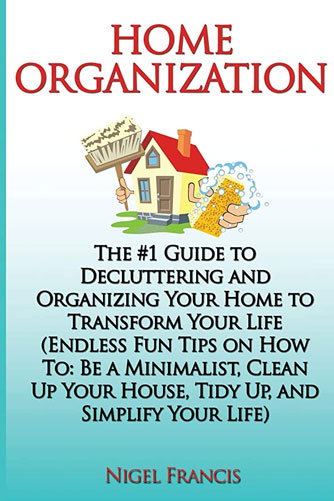
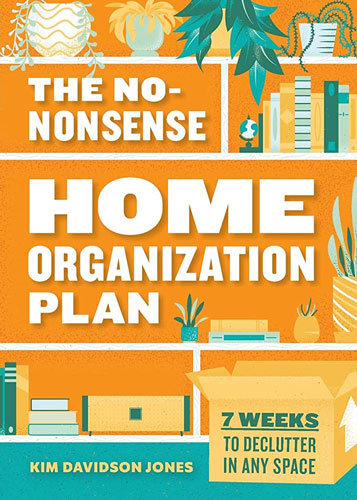


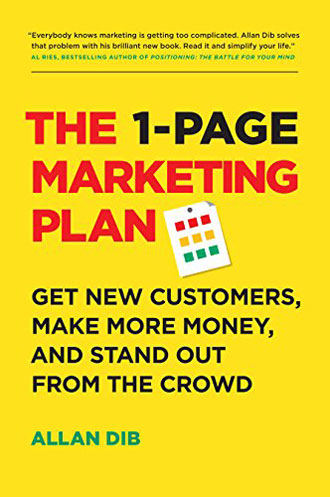
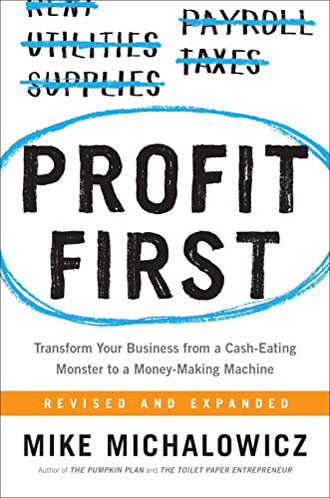
Leave a Reply